The Best Higher Education ERP Systems
Higher education ERP systems help institutions streamline their financial, administrative, and HR processes across all departments. This guide reviews the top platforms for organizations from small colleges to large universities.
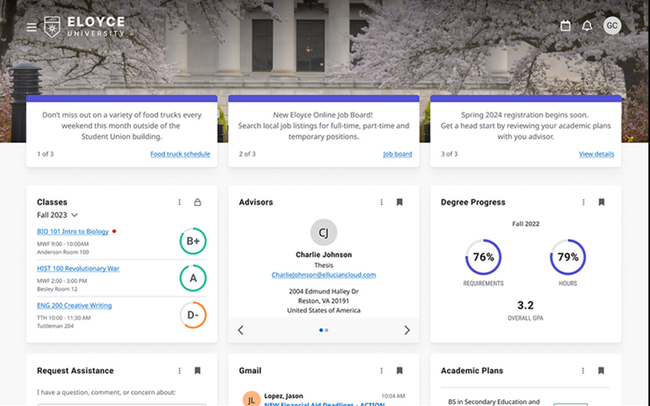
- Expertise in serving higher education facilities and organizations
- Scalable and extensible for growing systems
- Flexible deployment options
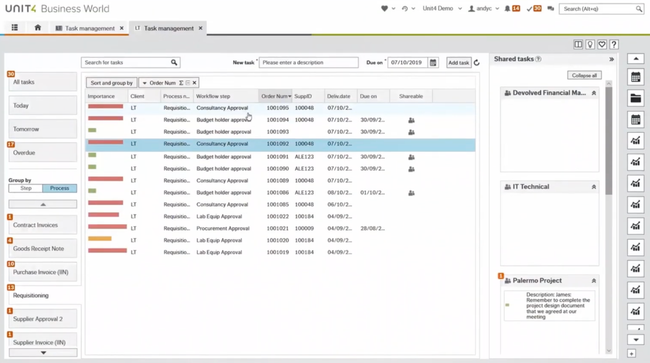
- Highly customizable to business needs
- Wide array of functional modules
- Intuitive, user-friendly interface
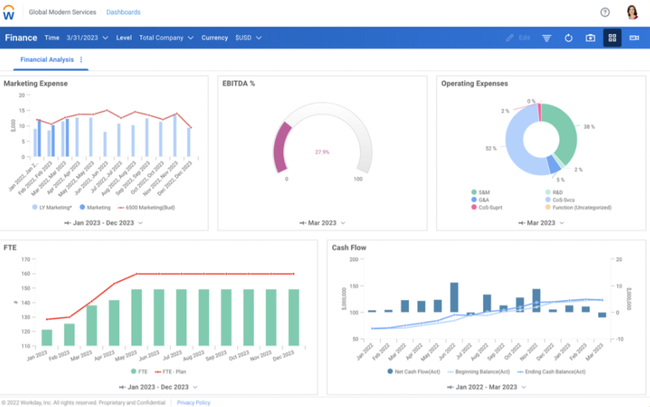
- Brainstorms community suggestions
- Configuration flexibility
- Powerful frameworks
Higher education ERP systems (enterprise resource planning systems) combine the functionality of student information systems (SIS), school administration software, human resources, and financial management. Using our in-depth review methodology, we’ve put together a list of the best higher education software:
- Ellucian Banner: Best Overall
- UNIT4 ERP: Best for Large Institutions
- Tyler Enterprise ERP: Best for Financial Management
- Workday: Best HR Functionality
- Fedena: Best for Education Boards
- Oracle Student Cloud: Another Good Option
Ellucian Banner - Best Overall
Ellucian Banner is our top pick for a specialized ERP system tailored for higher education institutions due to its scalability, extensibility, and higher education expertise. One notable element we tried was the “Plan your course” feature, which streamlines student registration and scheduling to enhance administrative efficiency and the user experience.
We found Ellucian Banner is most suited for mid-sized to large higher education institutions that require a comprehensive system to manage various aspects like student information, human resources, finance, and financial aid.
UNIT4 ERP - Best for Large Institutions
UNIT4 ERP is a highly customizable system with several modules. This flexibility is a key advantage, allowing you to customize the system to meet different departments’ specific needs. This is crucial for universities that manage thousands of students and hundreds of faculty.
UNIT4’s ability to automate large journal entry processes and improve state and federal reporting highlights its efficiency in managing complex financial operations. This feature is especially beneficial for higher education institutions that often deal with intricate funding and reporting requirements.
Tyler Enterprise ERP - Best for Financial Management
Tyler Enterprise ERP’s school edition offers a strong financial management module consolidating data across all departments. It includes a business intelligence module with configurable dashboards. It lets you track budgets, monitor invoices, and review purchasing activities from one central hub. You can even drill into each facility for detailed expense tracking.
The data from the financial module can be turned into comprehensive reports for better analysis. It includes over 400 pre-formatted reports, gathering financial and HR data for the entire institution. These can be departmental budgets, facility maintenance costs, or even staffing and licensing analyses. Once generated, they can be printed, exported, and emailed for efficient communication.
Unfortunately, Tyler Enterprise ERP does not publicly share its prices. That said, it features a module structure, so schools can purchase only the modules they need and add more as they grow. This makes it more flexible for smaller, budget-conscious organizations.
Workday - Best HR Functionality
We picked Workday because it blends financial management with human capital to provide real-time insights into both. Workday’s over 600 third-party integration capabilities and in-depth people analytics make it particularly beneficial for higher education institutions that require dynamic management tools.
Workday also has AI-driven features for employee engagement and skills management. This can relieve stress on workers and provide real-time insights.
Fedena - Best for Education Boards
Fedena meets the requirements of education boards like CBSE, International Baccalaureate (IB), ICSE, Regional State Board, and more. Integration with Moodle learning management system and other plugins is another great benefit. We also liked the solution’s customizable dashboard with ‘dashlets’, which provides users with an at-a-glance overview of critical information, making it a potentially efficient tool for educational institutions.
Oracle Student Cloud - Another Good Option
Oracle Student Cloud is a “next-generation” higher education ERP software designed to streamline back-office operations and improve the student experience. Oracle is already a force in the world of ERP systems, and Student Cloud is their shot at staying competitive in the world of higher education.
Top features of Oracle Student Cloud include financial planning, recruiting, and a full student information system. This software is completely cloud-based (SaaS) and can be accessed anywhere it’s needed on campus.
What Are Higher Education ERP Systems?
Higher education ERP software helps support academic-related business processes in colleges and universities, such as exams, grades, tuition billing, scheduling, and overall administration. These college ERP solutions combine the handling of academics of college between students and teachers with the administrative nature of running an educational organization.
Higher education has always had a unique organizational model compared to any other business structure. As such, traditional business software doesn’t provide what schools need. Educational ERP software systems are replacing the practice of having multiple software programs to handle specific workflows, such as overall management, financials, and administration. Vendors are taking note, and are beginning to develop fully-integrated options that let universities provide best practices for students, teachers, administration, and beyond.
Key Features
- Student Information Systems: Store important details of students. Allow students to register for classes. Provide advising assistance to students. Includes administration tools such as grade management and tracking attendance. Creates reports for attendance data or other institutional goals.
- Human Resources: Manage your teaching staff and fill voids to ensure all classes can be run at capacity. Monitoring budgets for potential new teaching positions. View timesheets, leave requests, and compensation. Identify the right candidates via talent management. Track tenure and any salary changes. Process payroll.
- School Accouting: Handle the primary accounting and financial management involved with running your higher educational institution. Includes tuition and fee management, budgeting, accounts payable, accounts receivable, reporting, procurement and requisitions, and grant certification.
- Financial Aid Management: Handle awarding and disbursing financial aid to students and link it with their payment accounts to pay for tuition, room and board, meal plans, and more. Calculate needs analysis reports to know where aid needs to go the most.
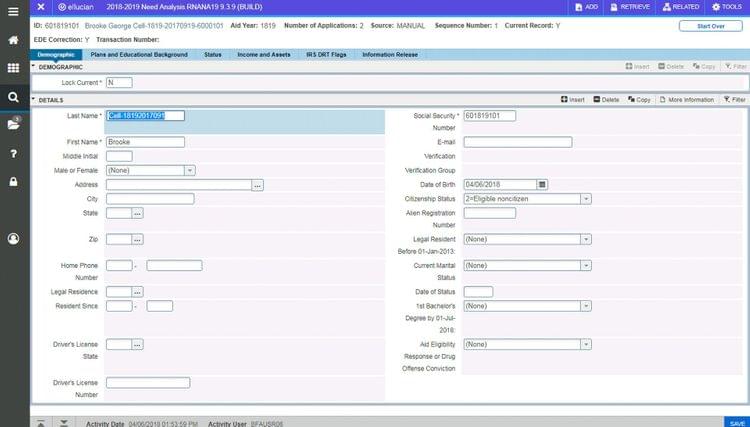
Primary Benefits
ERP for educational institutions helps handle the administration of the education-related process, including fees paid by students, managing the university library, monitoring student grades, and sending university information and details to students, alumni, and staff. Whether a community college or a large privately run university, some of the top benefits of higher education ERP systems include:
Manage Student Information Effectively
Colleges and universities need a higher education ERP system to help students, faculty, and administrative staff use data in a more organized and structured manner for effective project management. A correctly deployed ERP software will help your college organize data and automate processes in your academia management.
One example is staying compliance with any learning criteria your state has set forth, or any benchmarks your university has set up on its own. Some higher education ERP software will have a direct link to state entities or licensure boards to monitor your school’s performance. You can also record all activities by program (whether recruitment, employment, school advertising, etc.), gather analytic data from prebuilt reports, and send useful information to program coordinators who desire the ability to chop up student enrollment data.
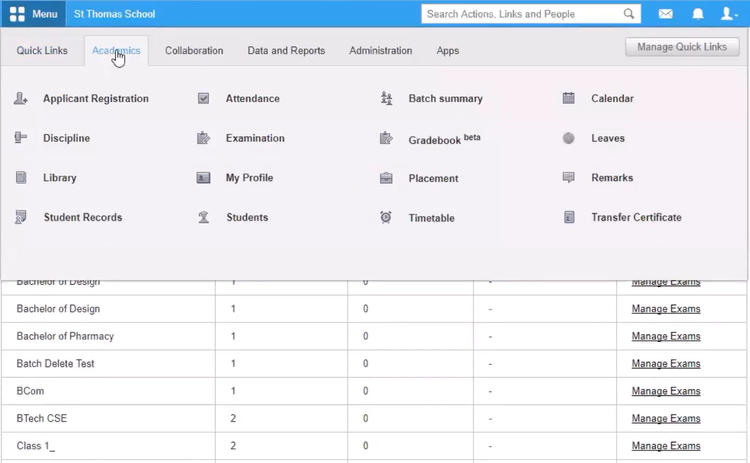
Connect Departments Across Campus
Communication systems in higher education ERP systems will let teachers, non-education staff, administrators, and students have a voice and talk with one another. This can help ensure that all levels of your university are on the same page.
Once barriers have been removed from communication, students can easily ask questions online for other students, teachers, or TAs to help answer them. This sense of community can encourage discussion and help students explore previously unthought-of ways of answering questions, completing assignments, and studying for tests.
Additional School Software Options
Some people refer to higher education ERP software as a type of school management software. The intent of both types of software is the same, to optimize school operations, but the environment they are put into is the key difference:
A school management software automates the administrative tasks of K-12 educational institutions. A higher education ERP system focuses just on higher-education learning environments like colleges, universities, and post-secondary schools.
In short, a general school management software would cover the functionalities a K-12 school may need that a college would not, such as disciplinary tracking on students, management of after-school programs, and reporting to the state for state-issued funding purposes.
Learning Management and Student Information Systems
The core of any student management software is the student information systems (SIS) which store data on all students registered to your college. A student information system manages student data such as registrations for classes, grade management, transcripts, and schedules. In a college and higher education environment, students can access their record in a student information system to change their contact details, apply for a major, view their course load, and check their grades.
Students and faculty alike can also monitor financial aid disbursement, check residency status, look at next semester’s course offerings, and take care of any academic services such as placement testing, scheduling meetings with advisors, and more.
Student information systems for higher education can also include learning management systems (LMS). An LMS provides the administering, documenting, tracking, reporting, and delivery of educational courses. This lets students browse available classes, sign up for courses that help meet their major requirements, message teachers, submit homework, and more.
School Administrative Software
Administrators may have less of a hands-on approach compared to teachers in the classroom, but they will take care of processing student payments and make sure classrooms, lecture halls, computer labs, and other key resources are up to par and operating as they should be. As such, school admissions management modules form a core part of higher education ERP systems. It covers a wide range of administrative tasks like class scheduling, attendance management, and faculty management, and even stores the health records of students.
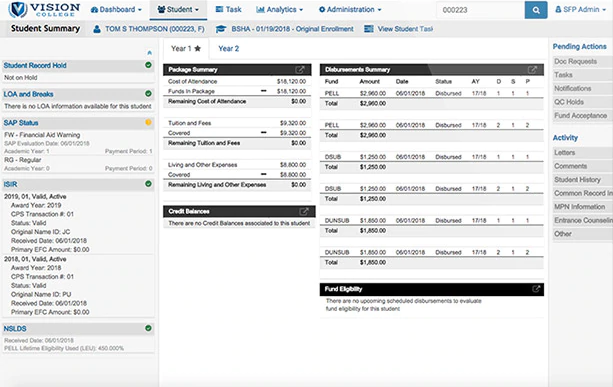
Pricing Guide
Using our list of top products as a starting point, the cost of higher education ERP systems ranges from $14/month to $5,000/year. However, the total cost is typically dependent on the number of user seats, FTE students, staff level, or add-on modules required. Selecting the deployment method is another important decision, as there are long-term price differences between an on-premise and a cloud-based ERP system.
All these factors can lead to exponentially rising costs from the relatively affordable $14/month starting point. Fortunately, many schools and colleges can find discounts through nonprofit organizations. These organizations generally have established relationships with software vendors and can help negotiate better terms for ERP implementation contracts.





























